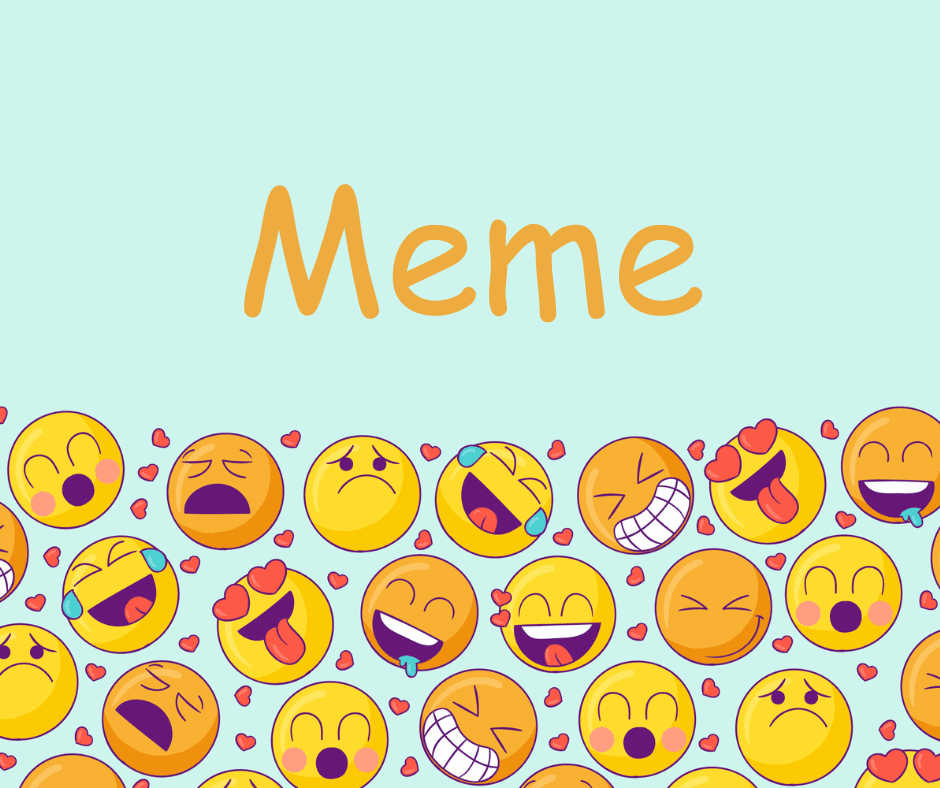Internet memes have become a ubiquitous part of our online lives. From viral videos to image macros, memes have taken over social media platforms and even influenced mainstream media and advertising. But have you ever stopped to wonder where the word "meme" comes from? In this blog post, we will take a deep dive into the history of the word "meme" and explore how it came to be associated with internet culture.
The Origin of the Word "Meme"
The word "meme" was first coined by evolutionary biologist Richard Dawkins in his 1976 book "The Selfish Gene". Dawkins used the term to describe an idea or behavior that spreads from one person to another within a culture, much like how genes are transmitted through biological reproduction. He derived the word "meme" from the Greek word "mimeme," which means "that which is imitated." He chose the term because he wanted a word that was similar in sound to "gene" and also conveyed the idea of cultural transmission.
The Evolution of Memes
While Dawkins' original definition of "meme" referred to cultural transmission in general, the term has since evolved to specifically refer to internet memes. The term "internet meme" was first used by Mike Godwin in a 1993 Usenet post, and the practice of creating and sharing memes has since become a widespread phenomenon on social media platforms such as Twitter, Instagram, and TikTok.
Internet memes are typically created by taking an existing image or video and adding a caption or other text to create a humorous or satirical message. Memes often spread rapidly and widely online, with users sharing them on social media platforms and other digital channels. Memes can also take on a life of their own, with users remixing and reinterpreting them in new and creative ways.
The Impact of Memes on Culture
Internet memes have become an important part of modern culture, with some memes even becoming political or social commentary. Memes have been used to comment on everything from current events to popular culture, and have even been used as a form of activism or protest. The impact of memes on culture is so significant that the term "meme magic" has been coined to describe the way in which memes can influence real-world events.
Fun Facts:
- The word "meme" was first coined by biologist Richard Dawkins in his 1976 book "The Selfish Gene," and he originally intended it to describe cultural transmission in general, not just internet memes.
- The first internet meme is believed to be the "dancing baby," a 3D animation that first appeared on the internet in 1996.
- The "Rickroll" meme, in which users are tricked into clicking a link that leads to the music video for Rick Astley's 1987 song "Never Gonna Give You Up," originated on 4chan in 2007 and became a viral sensation.
- The "Keep Calm and Carry On" meme, featuring the slogan from a World War II-era British propaganda poster, has been remixed and parodied countless times since it first appeared on the internet in the mid-2000s.
- The "Pepe the Frog" meme, which originated on the website 4chan, was co-opted by far-right groups in the United States and became a symbol of hate speech.
- Memes have been used as a form of political activism, with users creating and sharing memes to comment on current events and political issues.
- The most popular meme of all time is "The Distracted Boyfriend," which features a stock photo of a man turning away from his girlfriend to look at another woman. The meme has been shared and remixed countless times since it first appeared in 2017.
- The impact of memes on culture is so significant that the term "meme magic" has been coined to describe the way in which memes can influence real-world events, such as the 2016 U.S. presidential election.
- Memes have also been used as a form of language, with some people using memes to communicate complex ideas and emotions that are difficult to express in words.
- Some researchers have even suggested that memes may have played a role in human evolution, by allowing early humans to transmit cultural knowledge and behavior more efficiently.
- The popularity of memes has given rise to a new form of advertising known as "memetic marketing," in which brands create and share memes as a way of engaging with younger audiences.
- Memes have also become a source of income for some creators, with popular meme pages on social media platforms like Instagram and TikTok earning thousands of dollars in advertising revenue.
- The world's first meme museum, the Museum of Internet, opened in Zagreb, Croatia in 2020, showcasing the history and impact of memes on society.
- The popularity of memes shows no signs of slowing down, with new memes and trends emerging every day on social media platforms.
- Finally, memes have created a sense of community and shared experience among internet users, bringing people from different parts of the world together over a shared love of humor and pop culture.
Conclusion
The history of the word "meme" is a fascinating story of how a term coined by a biologist to describe cultural transmission came to be associated with internet culture. From its origins in Dawkins' "The Selfish Gene" to its evolution as a term used to describe internet memes, the word "meme" has come to symbolize the power of cultural transmission in the digital age. Internet memes are now an important part of modern culture, with the potential to influence everything from politics to popular culture.
Discover More
Most Viewed
Christmas is a season of joy, love, and traditions. And what better way to get into the holiday spirit than through timeless carols? These musical gems have been bringing people together for generations. Here’s our ranked list of the Top 10 Christmas Caro…
Read More















